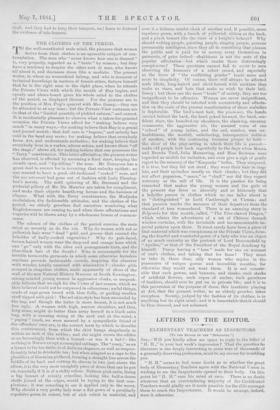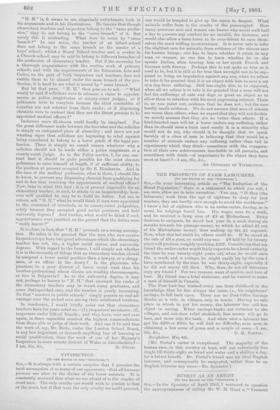LETTERS TO THE EDITOR.
ELEMENTARY TEACHERS AS INSPECTORS.
(To THE EDITOR OF THE " SPECTATOR."] Sin,— iLrill you kindly allow me space to reply to the letter of " H. II," in your last week's impression P That the question he discusses is one deeply interesting to some tens of thousands of a generally deserving profession, must be my excuse for troubling you. " H. II" seems to feel some doubt as to whether the great body of Elementary Teachers agree with the National Union in wishing to see the Inspectorate opened to their body. On this point let " H. H." ease his mind at once. There is no doubt whatever that an overwhelming majority of the Certificated Teachers would gladly see it made possible for the elite amongst them to reach the Inspectorate. It would be strange, indeed, were it otherwise. "H. H." is, it seems to me, singularly unfortunate, both in his arguments and in his illustrations. He fancies that though elementary teachers and inspectors belong to the "same profes- sion," they do not belong to the "same branch" of it. But surely this is misleading. What does he mean by "same branch ?" In one sense, the teacher of an infant-school does not belong to the same branch as the master of a boys' school; whilst a Board School teacher and a, worker in a Church school, may be said to belong to different branches of the profession of elementary teacher. But if the necessity for a thorough acquaintance with the routine work of primary schools, and with the requirements of the Education Acts and Codes, on the part of both inspectors and teachers, does not entitle them to be classed under the same branch of the pro- fession, it is hard to see what is meant by " same branch.'
But let that pass. " H. H." then goes on to ask :—" What would be said if solicitors were to advance a claim to appoint- ments as police magistrates or county-court judges; or if policemen were to complain because the chief constables of counties are not selected from their ranks ; or if dispensing chemists were to contend that they are the fittest persons to be appointed medical officers ?"
Instances more ill-chosen could hardly be imagined. For the great difference made between the barrister and the solicitor is simply an antiquated piece of absurdity ; and there are not wanting signs that solicitors are beginning to rebel against being considered to belong to a lower grade of the legal pro- fession. There is simply no sound reason whatever why a solicitor should not be made either• a police magistrate or a county-court judge. As to the Police service, I, for one, con- tend that it should be quite possible for the most obscure policeman to raise himself at length, if of sufficient ability, to the position at present occupied by Sir E. Henderson. And in the case of the medical profession, what is there, I should like to know, to prevent any dispensing chemist from qualifying for and in due time receiving the appointment of medical officer ? Now, bear in mind this fact : it is at present impossible for an elementary teacher, as such, to attain to an inspectorship, how- ever well qualified he may be to fulfil its duties. Let me, in return, ask " H. H." what he would think if men were appointed to the command of ironclads, or to county-court judgeships, solely because they occupied good social positions and held university degrees ? And further, what would he think if such appointmenss were justified, on the ground that the duties were " easily learnt• P"
It is clear, iu fact, that " H. H." proceeds on a wrong assump- tion. He takes it for granted that the men who now receive Inspectorships have two great advantages which the elementary teacher has not, viz., a higher social status, and university degrees. With regard to the former, I will simply ask whether it is in the necessity of things that an elementary teacher should be assigned a lower social position than a lawyer, or a clergy- man, or an officer in the Army P Is the physician who practises in a poor district of lower social rank than his brother-professional whose clients are wealthy cheesemougers, or live in Belgravia ? As to the university degree, it may not, perhaps be known to " H. H." that amongst the ranks of the elementary teachers may be found many graduates, and some distinguished ones, and the number is yearly increasing. So that " masters in public schools " simply possess no real ad- vantage over the picked men among their certificated brethren.
In conclusion, I would briefly point out that elementary teachers have for years acted as,—(1), inspectors' assistants ; (2), inspectors under School Boards ; and they have, over and over again, in these capacities received the highest commendations from those able to judge of their work. And can it be said that the work of, say, Mr. Ricks, under the London School Board, is any less important, or demands anything less of learning or social qualification,' than the work of one of her Majesty's Inspectors in some remote district of Wales or Lincolnshire P-



































 Previous page
Previous page